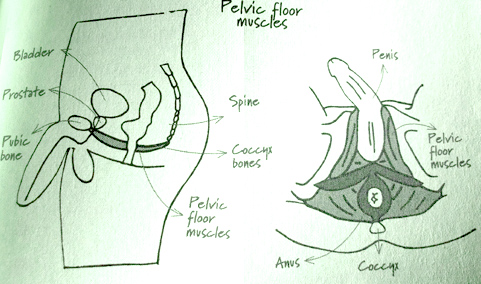Pelvic Floor Physiotherapy
WHAT IS PELVIC HEALTH PHYSIOTHERAPY?
Pelvic Health Physiotherapy also known as pelvic floor physiotherapy or pelvic physiotherapy is the treatment and assessment of the pelvic area or of conditions associated with it. It addresses not only the pelvic floor musculature but also symptoms of bladder, bowel and sexual function.
Pelvic Floor Muscles
 Male pelvic floor muscle anatomy
Male pelvic floor muscle anatomy
Pelvic floor muscles are located at the base of the pelvis and act as a sling supporting the bladder and rectum in males, and the bladder, the uterus and the rectum in females. The pelvic floor muscles plays a key role in controlling the bladder and bowel function, sexual appreciation, core stability, and helping to pump out the lymphatic flow of the pelvis. These muscles can sense whenever there is change in pressure (for example when you cough or sneeze) and contract to support the organs, at the same time clamping the urethra tube to prevent urinary leakages.
Why is important to address the pelvic floor muscles, its ligaments or fascia system? The pelvic floor muscles can be palpated internally, and not all physiotherapists have the training and expertise to be able to assess them. Some cases of low back pain, hip pain, pelvic pain, bladder symptoms such as leakages or urgency and frequency can be a result of a tight, tensed or over stretched pelvic floor muscles.
HOLISTIC PELVIC HEALTH
Holistic pelvic health goes beyond assessing the pelvic floor musculature, its ligaments or fascia: it also addresses the entire body or other contributing factors for the disease or condition. It treats each individual and body uniquely, with the goal of identifying key factors, which are affecting the pelvic condition.
 "Intuitively looking at the big picture can give us all the answers"
"Intuitively looking at the big picture can give us all the answers"
A holistic health approach is addressing all the independent parts that can affect health (emotional, physical or psychological), and by addressing the part that is not working properly, harmony and well-being is established. Treating urinary incontinence, or pelvic pain holistically is addressing poor sleeping habits, strong emotional response to every leakage episode, GI inflammation, depression, etc... all components needs to be addressed to improve incontinence and/or pain.
Principals of Holistic Health.
- Healing comes from unconditional support and understanding
- A person is ultimately responsible for his or her own health and well-being
- All people have healing powers
- Healing takes a team approach, including the health practitioners and especially the patient
The body as an emotional organ
I usually explain to my clients how our body can carry or store emotions. It is common that our body can be affected by emotions, such as fear, fright, feeling of overwhelm, sadness or grief. Emotions usually is transient, but if your state of being is altered, and negative emotions are prevelent, it can affect the body in many different ways. There is a strong relationship between depression and anxiety with pain and incontinence.
There are studies that show how we usually tense up our pelvic floor muscles during a stressful situation. Studies observed how the pelvic floor muscles were the first muscles to store tension in women while watching horror movies. "The pelvis stores emotions, history or trauma!" I find this correlates to what I usually see in my practice, especially in individuals who has long-term stress or anxiety. I noted how stress and anxiety is linked to a dysfunctional pelvic floor (mostly tensed and sensitive). Having a body reaction to a stressful situation is healthy and normal. But if stress is long-term and if you are unaware and continue to store tension in your body, eventually it will give you symptoms. Pelvic floor muscle tension symptoms can be as mild as an increase of urinary frequency to severe pelvic pain, urine retention and sexual pain.
